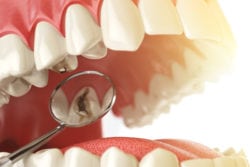The importance of our teeth cannot be underestimated. Teeth chew our food, nourishing our bodies, and help us stay healthy, strong and happy. Speaking of happiness, teeth make up our smiles which help make the first impression whenever we make the acquaintance of new people. We have two sets of the teeth in our lifetimes: our baby teeth and our adult teeth. Once we have your adult teeth, usually by your early teens, it’s crucially important to care for them properly as they need to last us the remainder of our lives. The most common threat to a long, healthy life for your teeth is cavities.
Wherever tooth enamel has weakened and broken open due to tooth decay is considered a cavity. These expose the soft tissues and nerves within which are very sensitive and can lead to temperature sensitivity, toothaches or even full blown infections. Chewing properly can be difficult because of the pain which limits your diet and can affect your health. Cavities are the most frequently diagnosed ailment from which humans suffer, coming in just behind the common cold.
But what can be done to prevent cavities? What causes them?


Our mouths are full of bacteria. These bacteria often concentrate and form plaque in difficult-to-clean places such as in between teeth and at the gum line. Whenever we eat foods that contain carbohydrates such as sugars and starches, the bacteria in our mouths break these down. The acids that result bind to the plaque and start to eat away at the enamel of our teeth.
Cavities are usually treated by your dentist with fillings, reinforcing the holes or weakened areas in tooth enamel with various substances. Fillings end the process of decay within the cavity by denying any further bacteria and acids access to the compromised part of the tooth. Fillings can be made by your dentist of composite resin, amalgamated metals, gold, silver or glass ionomer. Dr. Sheen will consult with you to decide which route would work best for your teeth.
The old adage “an ounce of prevention is easier than a pound cure” is true in this case as with most conditions. Brushing at least twice daily with a fluoride toothpaste and daily flossing to clear plaque and prevent the formation of cavities is your best defense. Reducing your intake of carbohydrates and increasing your hydration is also recommended. Having a dry mouth can speed up the acids which break down your teeth.
Scheduling regular check-ups and cleanings at our office will help stop any small problems before they become big ones. If you think you may be suffering from a cavity, would like to know more about how to prevent cavities or have any other dental need call 443.482.5202 or schedule an appointment online to consult with Dr. Vernon Sheen.
